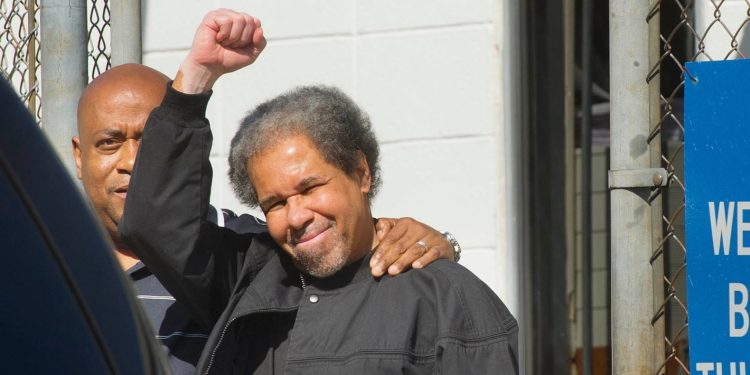NEWS CENTER – Albert Woodfox, who is thought to have been held in solitary confinement longer than any individual in US history, having survived 43 years in a 6ft x 9ft cell in one of America’s most brutal prisons, has died aged 75. Woodfox’s death was made public on Thursday by his long-term lawyers, George Kendall and Carine Williams, and by his brother Michael Mable. They said he had died from complications caused by Covid.
Woodfox was a member of the so-called “Angola Three” – prisoners who were wrongfully convicted of the 1972 murder of a prison guard, Brent Miller, in Louisiana state penitentiary. The prison was built on the site of a former slave plantation and was commonly known as Angola, after the country from which most of the plantation’s enslaved people had been transported.
Before the murder, Woodfox and his fellow Angola Three member Herman Wallace had set up a chapter of the Black Panther party inside the prison. They used it to protest against the segregation of prisoners and the unpaid cotton picking to which Black prisoners were subjected in chain gangs in the outlying fields.
He always insisted that his false conviction and consequent treatment were punishment for his Black radicalism. Soon after his conviction in Miller’s death, Woodfox and Wallace were both placed in solitary confinement, where they both remained almost without break for more than 40 years.
Wallace was released after a concerted legal battle in 2013, even as prison authorities continued to try to get him back inside. He died from cancer two days later. Woodfox was released in 2016 on his 69th birthday. Days after walking free, he told that he had managed to endure decades of solitary, despite frequent terrifying bouts of claustrophobia, through sheer force of willpower.
“We made a conscious decision that we would never be institutionalized. As the years went by, we made efforts to improve and motivate ourselves,” he said.
After his release, Woodfox wrote a prize-winning memoir, “Solitary: Unbroken by Four Decades in Solitary Confinement. My Story of Transformation and Hope.”
In later interviews over the years, and in his 2019 book Solitary, which was a finalist for the Pulitzer prize, he gave more detail on the extraordinary strength that allowed him and Wallace – “the other part of my heart”, as Woodfox described his friend – to withstand solitary. The conditions they endured have been known to cause mental breakdown in individuals within a week, let alone 40 years.
In the book, he wrote about his childhood and how his mother struggled to keep the family cared for, how as a teenager and a young man he was in and out of jails and prisons, and how he became radicalized when he met members of the Black Panther Party, and went on to establish the first chapter of the organization at the Louisiana State Penitentiary in Angola to address horrific conditions at the former cotton plantation. Not long after this, he and fellow prisoner Herman Wallace were accused in 1972 of stabbing prison guard Brent Miller. The two men always maintained their innocence, saying they were targeted because of their political activity. Woodfox, Wallace and a third man, Robert King, became collectively known as the Angola 3.
Woodfox said that he buried himself in prison books, studying Frantz Fanon, Malcolm X and Marcus Garvey. He organized games played up and down the line of solitary cells by shouting down the tier or banging on pipes – that way they held maths tests and general knowledge quizzes about Black history.
He was most proud of having in similar fashion taught several young prisoners how to read.
“Our cells were meant to be death chambers but we turned them into schools, into debate halls,” Woodfox told. “We used the time to develop the tools that we needed to survive, to be part of society and humanity rather than becoming bitter and angry and consumed by a thirst for revenge.”
In the six years of freedom that Woodfox enjoyed he devoted himself to educating the public in the US and beyond about the atrocities of the US criminal justice system. He travelled widely domestically and around the world to address audiences of school children and judges.
At home back in New Orleans, he found joy wherever he could. He visited the grave of his beloved mother, Ruby Mable Hamlin, who had died while he was still incarcerated, and enjoyed untrammeled time with his daughter, Brenda Poole, his grandchildren and great-grandchildren, and his life partner, Leslie George.
He also adopted a stray dog found wandering on a levee near Lake Pontchartrain. He named the pup Hobo.
Notwithstanding all the institutional cruelty that was rained down on him over so many years, Woodfox remained an incurable optimist to the end. In his book he writes: “I have hope for humankind. It is my hope that a new human being will evolve so that needless pain and suffering, poverty, exploitation, racism, and injustice will be things of the past.”




